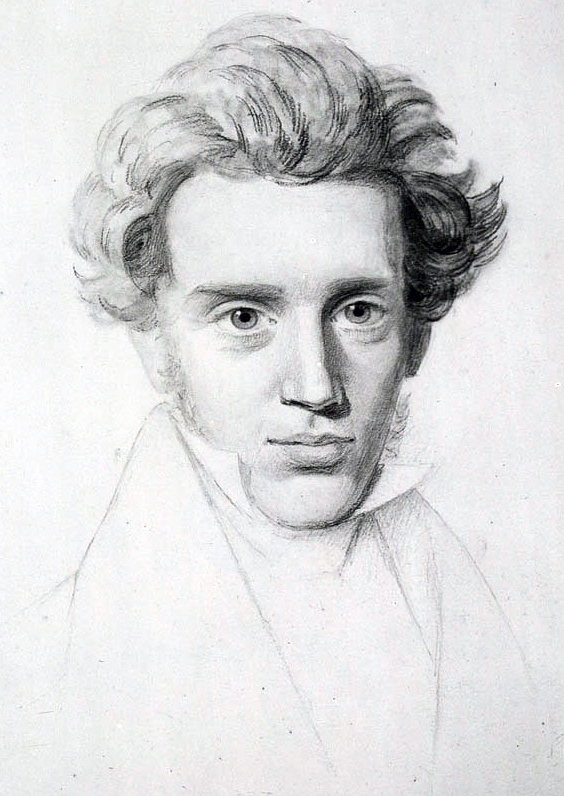Frases célebres de Søren Kierkegaard
Frases de vida de Søren Kierkegaard
“Vivir en el recuerdo es el más perfecto modo de vida que se puede imaginar.”
Fuente: Ortega Blake (2013). En Google Books. https://books.google.cat/books?hl=es&id=QJIAVIKP1dgC&q=Kierkegaard#v=snippet&q=Kierkegaard&f=false Consultado el 23 de diciembre de 2019.
Frases de fe de Søren Kierkegaard
Fear and Trembling
Søren Kierkegaard Frases y Citas
“Dejemos con toda libertad a los sabios el privilegio de no contradecirse nunca.”
/ "Dejemos con toda tranquilidad a la gente sabia el orgullo de no caer nunca en contradicción."
Fuente: Diario de un seductor
Søren Kierkegaard: Frases en inglés
Fuente: The Sickness Unto Death: A Christian Psychological Exposition for Upbuilding and Awakening
“a. Does a Human Being Have the Right to Let Himself Be Put to Death for the Truth? by H. H.”
1840s, Two Ethical-Religious Minor Essays (1849)
1850s, Judge For Yourselves! 1851 (1876)
Søren Kierkegaard, Journals and Papers XI3 B 109 p 178ff (quoted in Kierkegaard’s Way to the Truth by Gergor Malantschuk 1963 Augsburg Publishing House
1850s, The Journals of Søren Kierkegaard, 1850s
Soren Kierkegaard, For Self-Examination, Hong p. 10
1850s, For Self-Examination (1851), What is Required in Order to Look at Oneself with True Blessing in the Mirror of the Word?
Prefaces, Nichol, 1997 p. 39-40
1840s, Prefaces (1844)
Fuente: 1840s, Two Ethical-Religious Minor Essays (1849), P. 108
Soren Kierkegaard's Journals and Papers, Volume 1 Hong translation 1967 p. 14-15 1 A 101 January 14, 1837
1830s, The Journals of Søren Kierkegaard, 1830s
1850s, Two Discourses at Friday Communion (August 1851)
Fuente: 1840s, Philosophical Fragments (1844), p. 76
1850s, Two Discourses at Friday Communion (August 1851)
1840s, The Journals of Søren Kierkegaard, 1840s
Soren Kierkegaard, For Self-Examination, Hong p. 29
1850s, For Self-Examination (1851), What is Required in Order to Look at Oneself with True Blessing in the Mirror of the Word?
Fuente: 1840s, Two Ethical-Religious Minor Essays (1849), p. 65
Fuente: 1840s, Philosophical Fragments (1844), p. 32
Johannes Climacus p. 22-23
1840s, Johannes Climacus (1841)
Soren Kierkegaard, For Self-Examination, Hong p. 36-37
1850s, For Self-Examination (1851), What is Required in Order to Look at Oneself with True Blessing in the Mirror of the Word?
Søren Kierkegaard, Writing Sampler, Nichol P. 75
1840s, Writing Sampler (1844)
1850s, Two Discourses at Friday Communion (August 1851)
Fuente: 1840s, Two Ethical-Religious Minor Essays (1849), p. 60
“The Spirit brings faith, the faith.”
Soren Kierkegaard, For Self-Examination, Hong p. 81
1850s, For Self-Examination (1851), It Is the Spirit Who Gives Life
1840s, On the Concept of Irony with Continual Reference to Socrates (1841)
Journals IA 328, 1835
1830s, The Journals of Søren Kierkegaard, 1830s
1850s, Judge For Yourselves! 1851 (1876)
is it not as if he now went home from Communion!
Three Discourses at Friday Communion November 14, 1849 Hong translation 1997 P. 128
1840s, Three Discourses at the Communion on Fridays (1849)
Fuente: 1840s, Philosophical Fragments (1844), p. 75
Fuente: 1840s, Two Ethical-Religious Minor Essays (1849), P. 103
It would be a poetic motif to have him, gripped by Christ's divine power, step forward and witness for him.
Journals IIA 346 (1 February 1839)
1830s, The Journals of Søren Kierkegaard, 1830s
